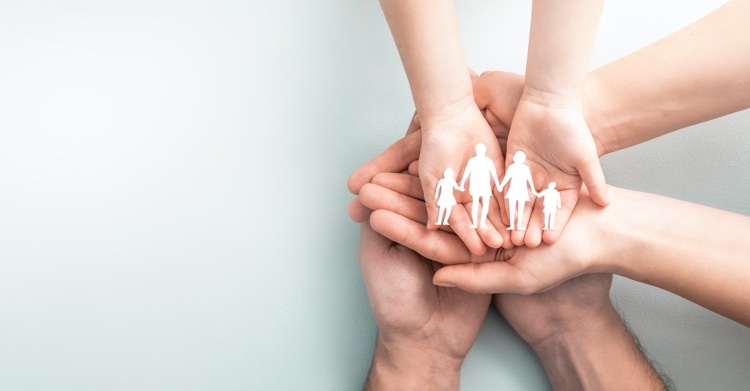I feel so deeply grateful to have come across the Hand in Hand Parenting by Connection approach. Before I had children, as a clinical psychologist, I became passionate about how we can prevent mental health difficulties and build emotional resilience and well-being in our children from an early age.
Of course, there are many structural inequalities and socio-economic factors that contribute to poor mental health. I care deeply about addressing these. There are also many psychological factors that contribute to poor mental health and conversely other psychological factors that help to build emotional resilience and well-being.
And so I became passionate about understanding what are the key ingredients that we can give to our children from an early age that will contribute to life-long emotional resilience and well-being.
The psychological evidence is crystal clear about the central importance of the quality of our children’s main care-giving relationships. Our children need secure attachment relationships to build strong mental health and happiness. These relationships need to be loving, attuned, responsive, fun, playful and safe. Interactions our children have with other adults including extended family and teachers are also important in building their sense of self and emotional well-being.
Fortunately, research by Edward Tronick and Allan Shore shows us that secure attachment involves:
1/3 warm, attuned, responsive relating
1/3 rupture
1/3 repair
And in fact, research also shows that children build more resilience if there is rupture in the relationship followed by repair, than no rupture at all (see Tronick and Gold, The Power of Discord, 2020). And so the repair part is key, and luckily we don’t need to perfectly attuned parents 100 percent of the time! 1/3 of the time is good enough!

Children then internalise these relationships including how their emotions are related to, and this forms the foundation of their inner emotional well-being and resilience.
When I became a parent, I knew all of this, but at times I still found it very hard to put it into practice. In spite of my best intentions, sometimes it was hard not to be reactive to my children and revert in the moment to negative and more punitive ways of dealing with them (and it still is sometimes, but much, much less so!). Parenting was also much more emotionally intense than I expected. It was also hard at times to stay focused on building a close connection with my children amidst the busyness of everyday life.
Therefore I was delighted and immensely grateful to come across Hand in Hand Parenting. Hand in Hand parenting gives you practical tools to build your close connection with your child. The regular practice of Special Time with my children has been a wonderful experience of keeping close and connected to them in amongst the busyness.
Hand in Hand also has great clarity about understanding the emotional roots of children’s challenging behaviour and gives you practical ways not to revert to out-dated, punitive and ultimately harmful ways of reacting to and addressing this behaviour. Many, many times with my own children, I have managed to avoid going into that sink-hole and vicious circle of authoritarian and punitive responses and have managed to deal with the behaviour with wisdom and kindness. And I also have my very bad moments still too! But, SO much less often that I would have done without Hand in Hand!
Responding to tricky behaviour with wisdom and kindness sometimes involves kindly setting a limit to the behaviour to allow a child to release the underlying emotions (staylistening) that are driving the behaviour. Other times this has involved using play (playlistening) to build connection to help my child to get back on track with their behaviour. The results are quicker resolutions to behavioural issues, and increased laughter, play and closeness and a real sense that I am responding in the wisest and most compassionate way to my children, as opposed to operating from an out-dated and emotionally harmful paradigm of control, judgement and shame.
The tools of Hand in Hand Parenting really allow me to enter my children’s worlds and respond to them appropriately, to really see where they are coming from, to really meet their needs for closeness and connection and play, and to join them more and more in their world of play and fun.
Hand in Hand Parenting also offers great insight and wisdom about how our heated reactions to our children often originate from ‘restimulated’ or activated past experiences often from our own childhoods. These activated past experiences come from our implicit emotional memory. We are not aware we are remembering a past difficult experience at the time as implicit emotional memories are not conscious. They occur more at the level of body sensation and emotional response, such as when we “explode” at our children, seemingly out of the blue. Hand in Hand parenting explains how our ‘restimulated’ reactions are often mirrors of how we were treated as children in similar moments. If we were shouted out, we tend to shout. If our feelings were minimised, we tend to do the same to our children.
This can be a really difficult issue because no matter how much in theory, you know what a kinder, wiser response would be to your child, in the heat of the moment, often the default, harsher, more negative reaction comes out of us, no matter our good intentions. This can be incredibly frustrating and guilt-inducing. Through the tool of listening partnerships, Hand in Hand gives you ways to work through these re-activated past experiences that are triggered by your children, so that these reactive episodes occur less and less. I have certainly had this experience and am incredibly grateful for it!